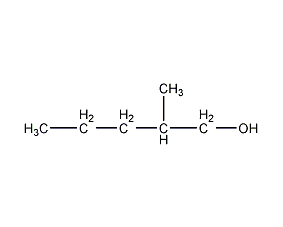2-Methyl-1-pentanol 2-Methyl-1-pentanol


Structural formula
| Business number | 02RF |
|---|---|
| Molecular formula | C6H14O |
| Molecular weight | 102.17 |
| label |
2-propylpropanol, 2-methylpentanol, 2-Methylamyl Alcohol, 2-Propylpropanol, Solvent for nitro spray paint, Solvent for fine paint, Thinner |
Numbering system
CAS number:105-30-6
MDL number:MFCD00004745
EINECS number:203-285-1
RTECS number:SA7175000
BRN number:1718974
PubChem ID:None
Physical property data
1. Properties: Colorless, transparent and flammable liquid with a strong pungent odor.
2. Relative density (g/mL, 20/4℃): 0.8242
3. Relative density (25℃, 4℃): 0.8206
4. Solubility parameter (J·cm-3)0.5: 20.273
5. Boiling point (ºC, 101.3kpa): 148.0
6. Refractive index at room temperature (n25): 1.4172
7. Refractive index (n20ºC): 1.4190
8. Flash point ( ºC, opening): 57
9. Viscosity (mPa·s, 20ºC): 6.6
10. van der Waals area (cm2·mol -1): 1.032×1010
11. Vapor pressure (kPa, 50ºC): 1.33
12. Eccentricity Factor: 0.726
13. Heat of evaporation (KJ/kg): 443.8
14. Specific heat capacity (KJ/(kg·K), 15ºC, constant pressure): 2.08
15. Volume expansion coefficient (K-1): 0.00075
16. Solubility (%, water, 20ºC): 0.31
17 . Critical temperature (ºC): 331.25
18. Critical pressure (MPa): 3.45
19. Solubility: Slightly soluble in water, able to mix with most organic compounds such as alcohols and ethers Solvent miscibility.
20. van der Waals volume (cm3·mol-1): 72.850
21. Standard heat of liquid phase Melt (J·mol-1·K-1): 259.9
Toxicological data
1. Skin/eye irritation: Start irritation test: rabbit skin contact, 10mg/24HREACTION SEVERITY, slight reaction; Standard Dresser test: rabbit skin contact, 500mg/24HREACTION SEVERITY, slight reaction; Standard Dresser test: rabbit eyes Contact, 750μg/24HREACTION SEVERITY, strong reaction; 2. Acute toxicity: Humans by inhalation TCLo: 50ppm; Rat oral LD50: 1410mg/kg; Rat inhalation LC: >5000ppm/6H; Mouse oral LD50: >3200 mg/kg; Rabbit skin contact LD50: 3560μL/kg; 3. It is of low toxicity. It is irritating to the skin and can damage the eyes.
Ecological data
None
Molecular structure data
1. Molar refractive index: 31.33
2. Molar volume (cm3/mol): 125.4
3. Isotonic specific volume (90.2K ): 284.9
4. Surface tension (dyne/cm): 26.6
5. Dielectric constant:
6. Dipole moment (10-24cm3):
7. Polarizability: 12.42
Compute chemical data
1. Reference value for hydrophobic parameter calculation (XlogP): 1.8
2. Number of hydrogen bond donors: 1
3. Number of hydrogen bond acceptors: 1
4. Number of rotatable chemical bonds: 3
5. Number of tautomers: none
6. Topological molecule polar surface area 20.2
7. Number of heavy atoms: 7
8. Surface charge: 0
9. Complexity: 35.2
10. Number of isotope atoms: 0
11. Determine the number of atomic stereocenters: 0
12. Uncertain number of atomic stereocenters: 1
13. Determine the number of chemical bond stereocenters: 0
14. Number of uncertain chemical bond stereocenters: 0
15. Number of covalent bond units: 1
Properties and stability
It is a flammable liquid. It does not corrode metal when dry, and the azeotropic mixture formed with water contains 40% of 2-methylpentanol. It is of low toxicity, so inhalation of vapor and long-term contact with skin should be avoided. Chemically reactive with primary alcohols.
Storage method
Can be stored in iron, mild steel, copper or aluminum containers.
Synthesis method
In industry, it is synthesized from pentene carbonyl and then hydrogenated to obtain the product.
Purpose
It is mainly used as a solvent or thinner for nitrocellulose spray paint and varnish, and can also be used as a solvent for dyes and oils.
